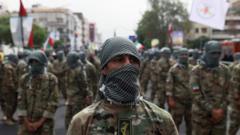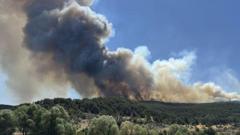Western intelligence agencies have revealed the dramatic rise in Iran's plots to kill dissidents abroad, with evidence suggesting deep ties between criminal organizations and the Iranian regime's overseas operations.
### Iran's Alleged Hookup with Criminal Gangs for Overseas Attacks Exposed

### Iran's Alleged Hookup with Criminal Gangs for Overseas Attacks Exposed
Iran's Revolutionary Guards reportedly escalate use of gangs for international assassinations.
In a disturbing new development, court documents obtained by BBC Eye Investigations indicate that Iran's elite Revolutionary Guards have sharply intensified their efforts to kidnap and assassinate opposition figures, including dissidents and journalists living outside the country. Western intelligence agencies report that these actions have considerably increased since 2022, with several high-profile targets, including former U.S. President Donald Trump, allegedly on the hit list.
In the UK, authorities arrested several Iranians earlier this month on suspicion of planning a terrorist attack, reportedly targeting the Israeli embassy in London. This follows court documents from both Turkey and the U.S. that suggest Iran has been contracting criminal gangs to execute plots beyond its borders, despite previous denials from the Iranian regime.
Central to these investigations is Naji Sharifi Zindashti, an Iranian criminal figure implicated in various international crimes, including drug trafficking. Zindashti's association with several murders of dissidents highlights profound ties between organized crime and Iran's intelligence agencies. He was charged in Turkey in connection with the 2017 murder of Saeed Karimian, a Persian TV network head previously sentenced by Iranian authorities for promoting Western values.
Investigative findings further trace Zindashti’s legacy of violence back to the 2019 assassination of Massoud Molavi, a former member of the Iranian Revolutionary Guard Corps who had exposed rampant corruption within Iran's political elite. This connection raises questions about Zindashti's escape from justice in Turkey and suggests a longstanding collaboration with Iranian intelligence.
Zindashti's criminal enterprises have allegedly collaborated with groups such as the Thieves-in-Law, a notorious organization from the former Soviet Union, in various assassination attempts on Iranian defectors abroad. A feature of these plots includes planned attacks on individuals like Masih Alinejad, an activist residing in the U.S., showcasing the extensive breadth of Iran’s reach to silence dissent.
As global tensions rise in the wake of sanctions imposed on the Iranian government, authorities in the U.S. and UK have implemented measures to counter these intelligence-driven efforts. Reports indicate that Iranian agents are actively disguising their operations as criminal activity, complicating law enforcement's ability to disrupt plots aimed at individuals regarded as threats to the regime.
The long-standing practice of using criminal networks appears to be a tactical maneuver employed by the Iranian leadership to obscure direct involvement in foreign assassinations and kidnappings. Observations suggest that Iranian officials have steadily cultivated relationships with such organizations, allowing the regime to deflect culpability while maintaining its global influence and silencing dissent.
Counter-terrorism expert Matt Jukes notes that infiltrating these criminal groups offers police an opportunity to thwart Iran's increasingly stealthy attempts to extend its influence and suppress its opponents internationally.
In the UK, authorities arrested several Iranians earlier this month on suspicion of planning a terrorist attack, reportedly targeting the Israeli embassy in London. This follows court documents from both Turkey and the U.S. that suggest Iran has been contracting criminal gangs to execute plots beyond its borders, despite previous denials from the Iranian regime.
Central to these investigations is Naji Sharifi Zindashti, an Iranian criminal figure implicated in various international crimes, including drug trafficking. Zindashti's association with several murders of dissidents highlights profound ties between organized crime and Iran's intelligence agencies. He was charged in Turkey in connection with the 2017 murder of Saeed Karimian, a Persian TV network head previously sentenced by Iranian authorities for promoting Western values.
Investigative findings further trace Zindashti’s legacy of violence back to the 2019 assassination of Massoud Molavi, a former member of the Iranian Revolutionary Guard Corps who had exposed rampant corruption within Iran's political elite. This connection raises questions about Zindashti's escape from justice in Turkey and suggests a longstanding collaboration with Iranian intelligence.
Zindashti's criminal enterprises have allegedly collaborated with groups such as the Thieves-in-Law, a notorious organization from the former Soviet Union, in various assassination attempts on Iranian defectors abroad. A feature of these plots includes planned attacks on individuals like Masih Alinejad, an activist residing in the U.S., showcasing the extensive breadth of Iran’s reach to silence dissent.
As global tensions rise in the wake of sanctions imposed on the Iranian government, authorities in the U.S. and UK have implemented measures to counter these intelligence-driven efforts. Reports indicate that Iranian agents are actively disguising their operations as criminal activity, complicating law enforcement's ability to disrupt plots aimed at individuals regarded as threats to the regime.
The long-standing practice of using criminal networks appears to be a tactical maneuver employed by the Iranian leadership to obscure direct involvement in foreign assassinations and kidnappings. Observations suggest that Iranian officials have steadily cultivated relationships with such organizations, allowing the regime to deflect culpability while maintaining its global influence and silencing dissent.
Counter-terrorism expert Matt Jukes notes that infiltrating these criminal groups offers police an opportunity to thwart Iran's increasingly stealthy attempts to extend its influence and suppress its opponents internationally.




















